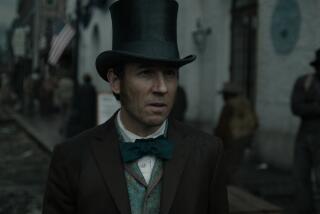Lincoln: forged by battle
- Share via
Lincoln’s War
The Untold Story of America’s Greatest President as
Commander in Chief
Geoffrey Perret
Random House: 470 pp., $35
*
Just when you think nothing new can be said about America’s most written-about president, along comes Geoffrey Perret with a strikingly fresh and informative look at Abraham Lincoln’s deep engagement with the strategy and tactics of the Civil War.
In “Lincoln’s War,” we are with the 16th president as he creates the role of commander in chief, and in doing so, Perret argues, forges the modern presidency. It was a role thrust upon him. Lincoln had limited experience in warfare, serving briefly in the Black Hawk Indian war. Immediately he had decisions to make. Should he resupply Ft. Sumter, S.C., at the mouth of Charleston Harbor? What if the Confederates resisted? He did; the Rebels opened fire; the fort surrendered and the war was on.
But what kind of war? Presidents, whatever their previous military experience, usually left the conduct of wars to the military chiefs. It quickly became clear that this war required a central civilian authority, someone to respond to the pressure from Congress, the armed forces, public opinion and foreign powers. It had to be the president. And Lincoln threw himself into a job for which he had no formal preparation, no precedent.
We meet a Lincoln fascinated by improved weaponry, who pushed for iron-clad ships like the Monitor and insisted upon arming increasing numbers of Union soldiers with a superior new breech-loading, repeating rifle. He tries out the new rifles on the ragged field that now is the White House South Lawn.
Perret takes us with Lincoln as he tries first this, then that, improvising, adjusting course along the way. Perret’s Lincoln is most appealing when he is most perplexed; you can feel his confusion and the complexity of the manifold problems he faces. The key, as always in managing complicated enterprises, is personnel; Lincoln had to decide which general should direct the war. Ulysses S. Grant finally emerged, but only after faulty attempts and near-disasters. Perret persuasively argues, for instance, that Lincoln’s insistence on the importance of taking Richmond, Va., was a serious and costly mistake. He implies that on this point, by rejecting sound advice to stave off Gen. Robert E. Lee in the East while concentrating on splitting the Confederacy in the West, Lincoln may have prolonged the war. Grant did eventually capture Vicksburg, Miss., on the Mississippi River, thus splitting the Confederacy.
Perret shows Lincoln deeply distressed by the suffering of the men wounded or killed in war. Over and over, the commander in chief makes the rounds of Washington’s overflowing hospitals, more than a score of them.
By the end Lincoln has, by trial and error, taken control of the huge fighting force he has called up. His generals are mostly his own. He is grimly determined to coerce the rebellious South to surrender. He has taken advice he shouldn’t have when he deferred to military “experts,” as in the first battle of Manassas, Va.; he has persisted in errors of his own, like his focus on Richmond and his fixation on freeing eastern Tennessee.
But he saves the Union and wins the war. Perret agrees with many other historians that it was Lincoln’s penetrating intelligence, his strong will and his steadfastness of purpose that enabled him to preserve the nation. Along the way, he ended slavery and built the foundations of the mighty nation you see around you. The author’s imaginative and lively tale shows us in personal terms how Lincoln did it.
More to Read
Sign up for Essential California
The most important California stories and recommendations in your inbox every morning.
You may occasionally receive promotional content from the Los Angeles Times.









